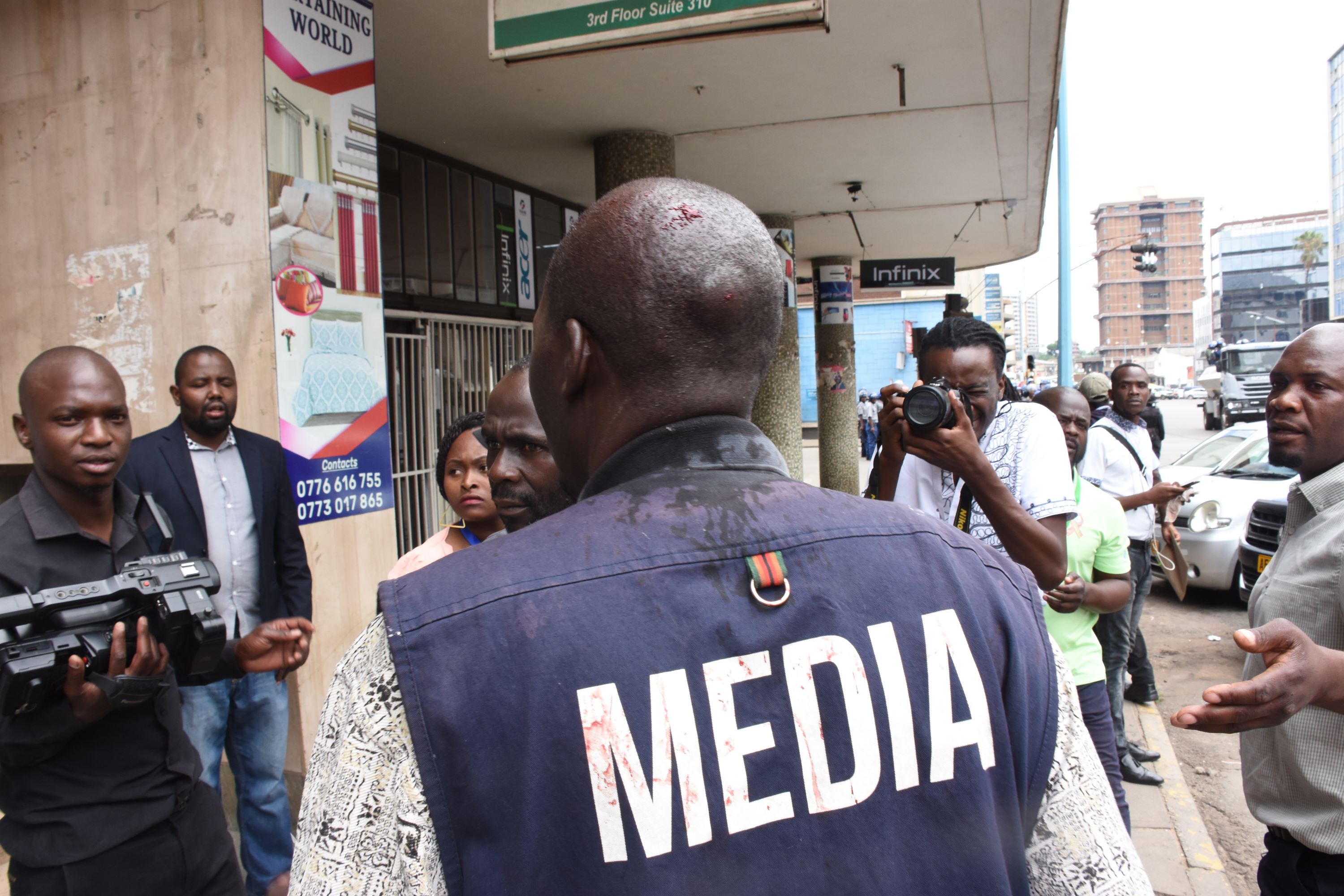With few job opportunities, harassment by the authorities and a global pandemic, the picture for balanced and truthful journalism is not a pretty one
In Zimbabwe, the twin ills of a stuttering economy and a polarised political environment are plaguing most professionals.
Teachers and health workers have been forced to declare “incapacitation” - meaning they are unable to work - mainly because of abysmally low pay. Meanwhile, members of the security forces have reportedly even resorted to armed robbery to make ends meet.
While ordinary citizens still expect to receive regular news updates and media coverage, regrettably, journalists and media workers are also suffering from low pay and poor conditions.
In journalism, as in most professions, nobody is guaranteed employment after training. Due to the limited number of media houses, paid internships are few. Determined to make it, students soldier on, often with few resources which will severely hamper their output. After training, thousands of aspiring journalists are roaming the streets, looking for work.
On top of this, when they do get work, they must endure incidents such as the police firing teargas into the offices of the online publication, 263 Chat, in Harare on April 4, 2019, an event that Amnesty International called “a blatant attempt to muzzle the media”. Or being beaten by riot police while going about their jobs, covering, for example, an address by the MDC Alliance’s Nelson Chamisa at the party headquarters later that same year.
In effect, the Fourth Estate is under siege in Zimbabwe - economically, politically and socially.
Hounding the media hounds
While incidents like this unfold, journalists are expected to remain ethical, balanced and factual. But, behind the sensational headlines, the Zimbabwean media is silently haemorrhaging.
Without jobs, some attempt freelancing, but a lack of experience, networks and regular gigs make it difficult to carve a living. Many journalists flock to public events and seminars in search of news, free food and beer to supplement their meagre earnings.
For women in media, occupying influential newsroom positions remains an ongoing struggle. The majority of female journalists still occupy non-managerial posts in newsrooms. Further, sexual harassment and patriarchal structures which favour men at work are rife. Yet, these are rarely reported, leaving women to suffer in silence.
For example, in 2019, Faith Zaba was hounded on social media for her perceived crime of being appointed as the first female editor at the Zimbabwe Independent, a popular weekly newspaper - a post previously held by men since its launch.
Conspiracy theories about how she managed to secure the post abounded, completely discounting her 27 years of experience in the field. Her colleagues were less than supportive as well. Instead of celebrating her achievement, on the day her appointment was announced, the “atmosphere in the newsroom was tense”, Zaba has recalled since.
A polarised arena
In Zimbabwe, the polarised political environment has separated media practitioners into two distinct factions. One group is the state-run media, which communicates government and ruling party stance without compromise. Little, if any, positive coverage is accorded to opposition political figures in the state media. Reporters working for these organisations are in danger of deserting their ethics to appease an elite minority.
Sadly, when these journalists do stray from the party line - such as when Herald editor Joram Nyathi did when he was caught in the crossfire of a turf war between the Ministry of Information and the Presidential communications department and failed to follow the correct line - they are purged at will.
Then there are independent journalists, who do challenge the official lines and try to hold people in power to account. For that, they are regularly dismissed as “champions of a western agenda”.
Earlier this month, aspiring presidential candidate Nelson Chamisa announced a decision to ban state media journalists from covering his party events, accusing them of bias towards the ruling party. Some may laud this approach, but Chamisa’s embargo on state scribes is just another attack on the freedom of association and access to news, and an attack on democracy.
Trying to exist somewhere between these two extremes has created a minefield for practising journalists.
Media workers, who are supposed to be neutral news conduits, are instead increasingly entangled in political power battles.
Those involved run the risk of not being prevented from upholding their professional pledge to deliver a free, balanced, and credible product to the masses.
While all this happens, press freedom, tolerance and democracy are the main casualties.
Harassed in the line of duty
The forthcoming March 26 by-elections, which many see as a pre-indicator to the 2023 general election, present another tricky test for members of the Fourth Estate.
As election fever grips the nation, the Media Institute of Southern Africa (MISA) has warned of the possibility of an escalation of violence. “We urge those who are active in politics and those who are vying for positions in the upcoming by-elections to value and respect journalists as they do their job,” Regional Chairperson Golden Maunganidze told New Zimbabwe, the online publication, last month. “In previous election periods, journalists have been harassed in the line of duty and we condemn it, journalists should be given time to do their job without fear of being harassed.”
Stringent media laws, such as the Cybersecurity and Data Protection Bill, which was recently signed into law, and others continue to make life difficult for journalists in Zimbabwe.
Internews, the international non-profit organisation monitoring journalism training and skills in 70 countries, published a report on the business environment for news media in Zimbabwe last year. It said: “While the government claims that the new laws are less restrictive, in practice they have heavier penalties and severe restrictions, particularly regarding political reporting. The media market has expanded somewhat under these laws: the government issued new licences for community and university radio stations which will expand the reach of local news in local languages.”
A marauding pandemic
COVID-19 has also severely impacted journalists and media houses in Zimbabwe. What advertising budgets are left have continued to favour state media, according to the Internews report. “The advertising market, slim at an estimated $152 million when last reported in 2015, was largely captured by media organisations aligned with government interests and receiving state-funded advertising,” it stated.
The state-controlled newspaper stable has four major titles, two published in Harare and the other two in Bulawayo, Zimbabwe’s “second capital”. The Zimbabwe Broadcasting Corporation (ZBC) operates radio and television stations. Nevertheless, even with guaranteed advertising revenues, state media has also continued to struggle.
The tight grip on the airwaves also continues: Applying and getting a media operating licence in Zimbabwe has historically accommodated those aligned to the ruling party, compounded by the high costs which means such a path is open only to those with deep pockets or corporations.
Some minor independent media operators have turned to innovative digital channels using WhatsApp, bulk SMS, and social media to reach audiences on their cell phones, according to the Internews report.
Nhau/Indaba, which means “news” in local vernacular, is one such emerging online media outlet which administers hundreds of WhatsApp groups, where they post news to members as well as selling low-cost advertising space.
Small victories
Despite all its the setbacks for media in Zimbabwe, more investigative online outlets have come on board, while another TV station - 3Ktv - was recently launched as an alternative for news consumers.
But, away from these few successes, the majority of local journalists’ lives are stuck in limbo, many succumbing to poverty and rarely recognised for their years of input and sacrifices for this noble profession.
As media houses continue to downsize, more and more stranded and underpaid journalists will inevitably be exposed to corruption.
Sadly, others are giving up and leaving the industry altogether which is undoubtedly undergoing a brain-drain. For decades, the media has been losing qualified and promising people to neighbouring countries, citing poor remuneration and poor working conditions, or even to menial jobs.
While the Fourth Estate is under siege, citizens will be starved of quality, reliable news. It is in such a vacuum that propaganda triumphs, going unchallenged and being accepted by consumers as the truth.
Derick Matsengarwodzi is a freelance journalist based in Harare, Zimbabwe
The views expressed in this article are the author’s own and do not necessarily reflect Al Jazeera Journalism Review’s editorial stance





































